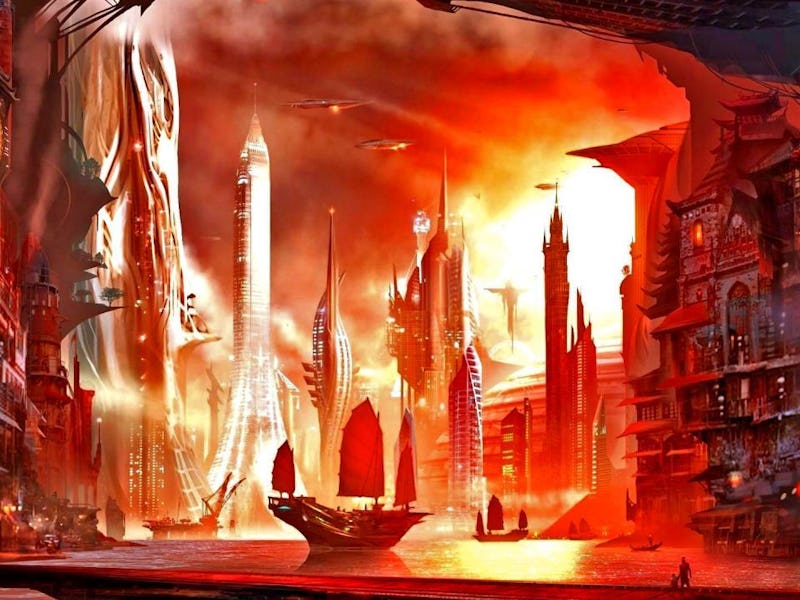The Best Science Fiction Writers on Earth May Be Chinese Scientists
The world's most populous country is obsessed with promoting incredibly speculative research and it's entertaining as hell.

China is making huge investments in scientific and technological research. Beijing was host to the World Robotics Conference. China is prepping plans to build the world’s biggest supercollider and take a leading role in particle physics research. And its space agency has just unearthed — literally — some bewilderingly awesome new things about the geology at the dark side of the moon. White coats are the new Mao suit.
Still, Chinese leaders seem less committed to the slow march of progress than to great leaps forward. They are, to put it mildly, obsessed with the impractical, the unfeasible, and the downright ludicrous. There was the announcement in November about an Iron Man lookalike bot meant to conduct missions in space. There’s the plan to launch a two-armed, satellite-repairing machine in space by 2020. There’s the depressing-as-hell self-driving bus. And there’s no reason to think any of these projects will actually take off. They seem to be public spectacles meant to hype the natives.
For foreign scientists, a lot of Chinese work is easy to dismiss or ignore. But that doesn’t mean it’s without value. In fact, it’s entertaining as hell, the stuff of a thousand Hollywood elevator pitches.
For instance, take a new proposal by Chinese engineers to create a space engine that runs on space junk. It would be a fantastic way to kill two birds with one stone: Reduce the scary amount of orbital debris that has the potential to threaten any satellite and spacecraft we have floating in our planet’s orbit, and provide a mechanism for spacecraft propulsion that doesn’t require the need to store a finite amount of fuel onboard.
Cool idea, right? Absolutely. Unfortunately, there’s also no way it could ever work. The researchers suggest the device would run on nuclear or solar power, but neither of these power sources make sense. And a spacecraft running on nuclear power and hurdling towards debris is not a good idea.
It’s not just in space and robotics where China seems to get science wrong. There’s also the country’s ridiculous plan to just start cattle cloning factory that’s meant to address increasing beef shortages as the world’s population rises and land allocated for agriculture shrinks and becomes abandoned. That’s actually a worthwhile project, but in typical Chinese fashion, the purpose doesn’t just stop there. The company in charge of the factory, Boyalife, has expressed big interest in developing the technology to clone primates, creating a lot of serious speculation that the factory could play a role as a human cloning factory down the road. Quotes from Boyalife’s CEO strongly suggest the company would move in that direction if given the chance.
A few years ago, Chinese scientists pitched an idea for using a diamond bullet fired at 620 miles per second to jumpstart a nuclear fusion reaction. It’s almost not worth getting into why this makes no sense (outside of the fact that nuclear fusion seems like the science equivalent of Dr. Dre’s Detox album — something that we will never see), but I’ll just say it’s dumb. Dumb but awesome.
Perhaps the wildest Chinese-sponsored project is the case of the first-ever human head transplant, which is set to take place in the country in 2017. Russian surgeon Sergio Canavero looked all over the world for a stage that would approve this procedure, finally convincing China to provide him with the hospital and personnel necessary to conduct it. “China will want you to know about this, just to spite the West,” Canavero told The Guardian. And he admits that the Chinese will probably conduct the procedure themselves on a Chinese citizen first, in order to test whether it works.
In all fairness, head transplants are possible. Vladimir Demikhov first proved it could happen in the 1950s in a head transplant of dogs, and then Robert White did the same thing on a pair of rhesus monkeys. The surgeries were successful, sure, but all the animals involved died days later because of graft-host rejection. So to think this will be successful on human beings is not just foolish — it’s deeply immoral.
If China’s scientists weren’t scientists but sci-authors, the country’s book business would be off the hook. This kind of stuff is perfect of B-list movies, or at the very least, episodes for a poor-man’s version of Black Mirror. Unfortunately, that’s not the case.
Although the country certainly has the money and prerogative to invest in whatever it sees fit, the rest of the world will not readily embrace China as a place of serious science and tech research until it learns to focus on substance over style.